A big post-jam update + some of our investigative inspirations
Rose and I created The Case of the Dungeon Descent in 72 hours as Jamwitch's entry for Ludum Dare 57. Since the jam, we've been working hard on updates, and I'm psyched to share the new post-jam version.
I've been on a major non-linear investigative game kick lately, and the awesome games in the genre inspired a lot of Dungeon Descent's design. In this post I'll dive into some of those ideas and games. If you haven't played them, check them out!
Scrying
The scry mechanic
Going into the jam, I was extremely inspired by Type Help and wanted to make a non-linear investigative game with an interesting search mechanic. We came up with a filtering-based mechanic: you can search by any keyword, but you can only discover a new scene by combining multiple keywords to narrow it down and uniquely identify that single scene.
It was an interesting idea to try out, but one of the big pieces of feedback we got on the jam implementation was it wasn't very clear how the different elements worked, like how clicking keywords led to different scenes being discovered.
Post-jam changes
In the updated version, I turned the keywords into tokens that you can collect and then place in your magical scrying circle. I'm hoping the interactions being more concrete makes it more intuitive - plus it gives a nice flavor of assembling ritual components.
Another big change is "peeks" - small previews of locked scenes showing the keyword that was scryed on. This does double duty of helping demonstrate how the search works and also giving a hint about the scene. Hopefully, seeing scenes you can't yet access feels less like a brick wall now and more like its own source of information.
Before
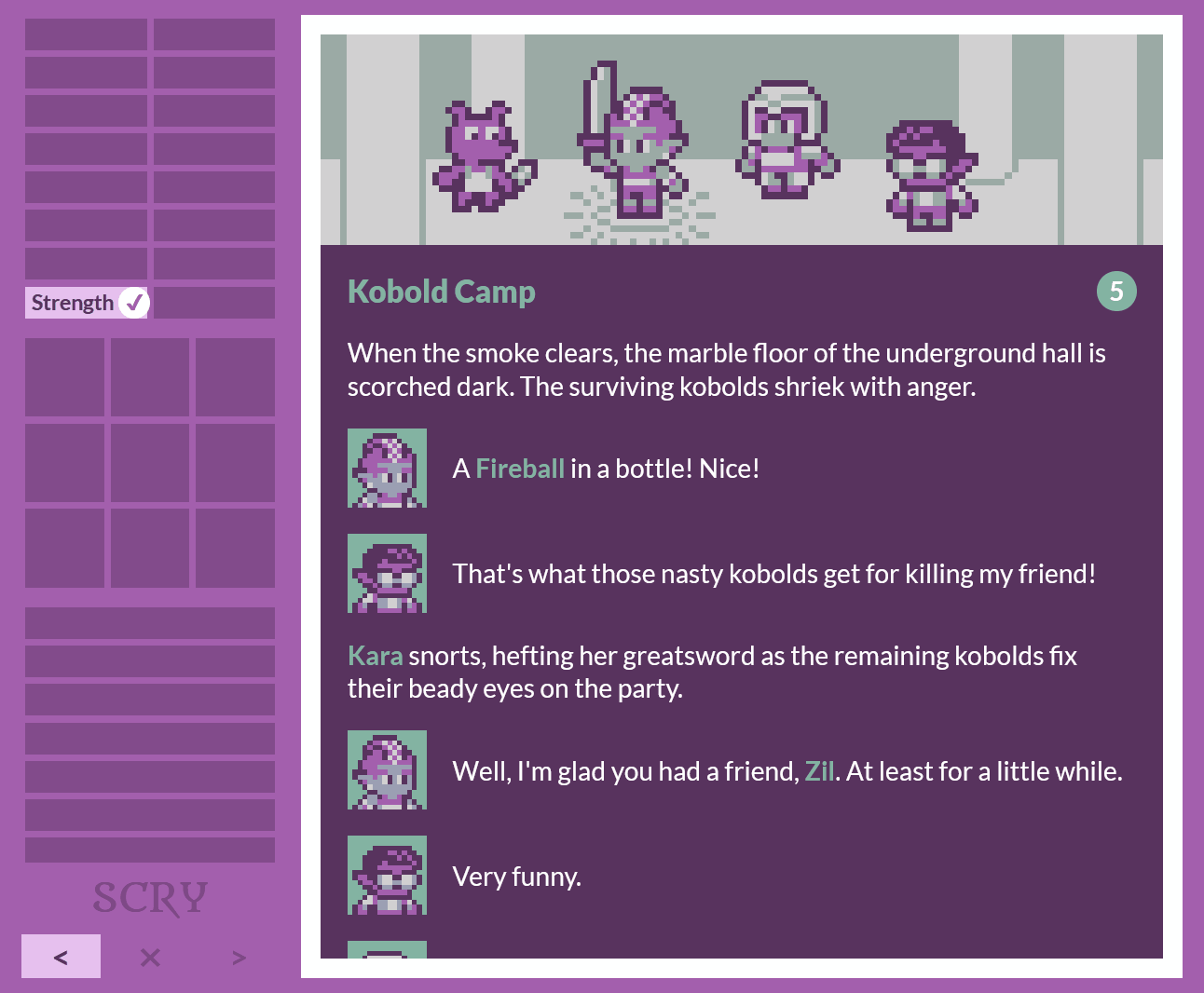
After
Fate tester
Record fates
One of the biggest changes in the post-jam version is we now have an Obra Dinn-style fate tester. To finish the game, you have to fill in the blanks on what happened to each character.
Adding this mechanic also gave me the ability to set up a smaller tutorial phase with Kara's party to get players used to the mechanic, then use a tester to gate the rest of the game.
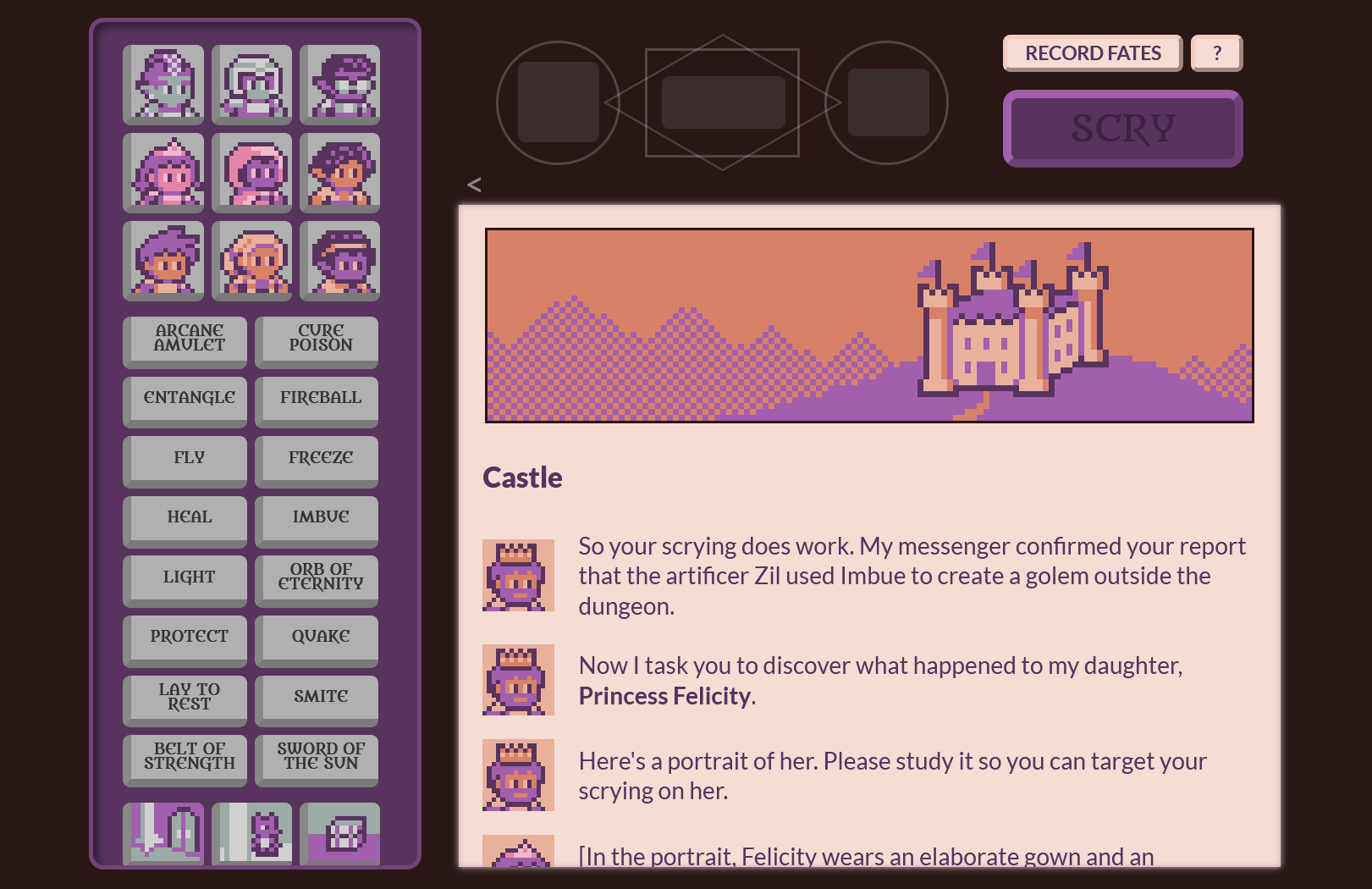
Tester inspirations
In the jam version, we didn't have any kind of tester to validate the player's understanding. My inspirations here were Her Story, in which discovering something new and figuring out the story for yourself is rewarding enough, and Type Help, in which the search mechanic itself makes finding the next scene a test of your understanding.
Then after LD, I played Riley & Rochelle and noticed how making small deductions as I went added an extra layer of satisfaction that drew me into the game and the narrative. That motivated me to try adding a fate tester element. I hope it's rewarding to fill out and motivates you to dig deeper into the story.
Story and puzzle
Deduction vs serendipity
One piece of feedback we received on the jam version was there wasn't enough deduction - players sometimes felt like they were just trying things at random. I wanted to improve that experience, but it also made me think about the goals of the game.
In Her Story style games, I really enjoy the serendipity aspect of the search results - you often turn up interesting things you weren't directly looking for. Discovering new, unexpected information feels exciting in a different way than the puzzle-solver's thrill of getting a deduction right. I really enjoy both feelings, and it's interesting to think about where different games fall on this spectrum. (In terms of how you find new pieces of information, Immortality is essentially all serendipity; Type Help is all deduction.)
I'll be happy if players experience some of that serendipitous feeling in Dungeon Descent, for example when following open questions like "I wonder who else used this spell?" "I wonder what happened to that party in this room?" - while still feeling that their searches are based on information they've learned and not purely random.
Post-jam changes
I didn't want to redo the story or add a lot of brand new content for a post-jam update, but I did revisit the scenes to see if I could improve the experience. Here's some of the things I was thinking about:
- Plan the beginning of the game to give a dramatic start (Felicity and Wren vs the dragon.)
- Plan the end of the game to make sure nobody can stumble on the final scenes too early.
- Add more specific hints along the progression to give opportunities for deduction.
- Add more interconnections and callbacks between scenes, even if they don't contribute to the actual progression. As one example, I added a mention of Imbue in the Trapped Shrine, even though you must have already discovered Imbue to get there. This is just a hunch, but I hope these interconnections will make the game feel more navigable and less random, even if you're not actively using them.
Reworking the scenes was an interesting challenge, and the downside was I had to cut some interesting moments and deductions from the original version as things got shuffled. I think there's potential to improve it a lot more, but at some point we had to stop and move on to updating the writing and art.
Because discovering scenes depends on the uniqueness of keyword combinations, adjusting keywords on one scene could lead to other scenes becoming easier or harder to find. I set up a scene graph tool to visualize the pathways between scenes and consulted that as I tried different changes.
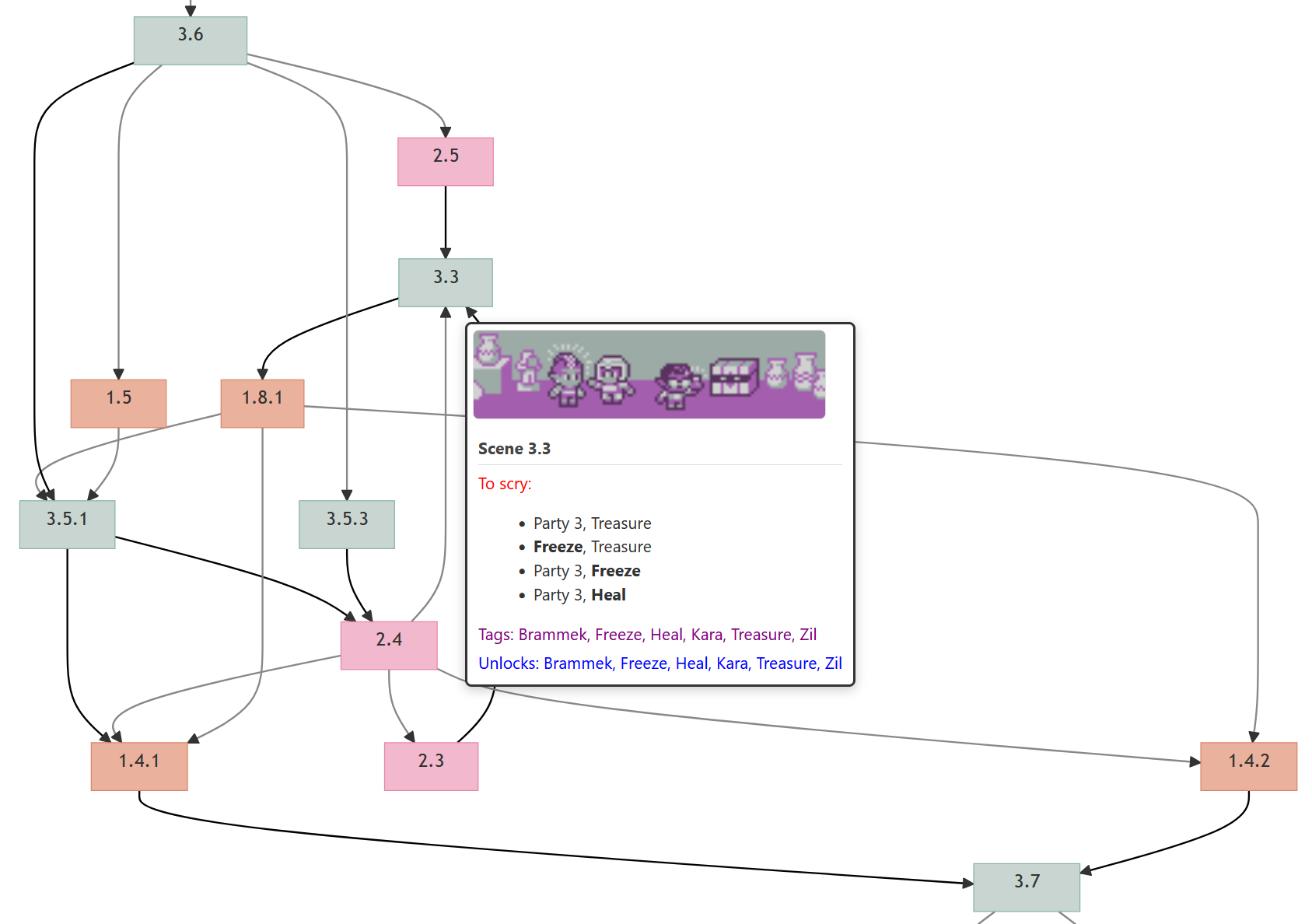
Hint system
Thinking about intuition
The Roottrees are Dead's intuition system, where evidence is marked with a count of new discoveries it can lead to, is an awesome way to nudge players down the right track without actually giving anything away.
In the jam version of Dungeon Descent, we were thinking along those lines and displayed the count of undiscovered scenes using each keyword. That's a poor substitute for intuition, though, since having many scenes left doesn't necessarily mean any of those scenes are discoverable, so at best it gives you ideas for what to brute force.
In the end, I don't think intuition is a great fit for Dungeon Descent - some steps are based on specific clues in other scenes, so intuition could be wired up for those, but other steps require exploring the keywords you have and seeing what comes up, which is harder to enumerate.
Hints
Instead, I added a simple hint system that can tell you the specific keywords you should scry on to unlock the next scene. The hint is revealed one keyword at a time - my hope is seeing the first keyword acts as a nudge in the right direction to go look at the missing scenes and think about how you can access them.
The hint system has two parts:
- A handcrafted list of next steps from the start of the game to the final scenes.
- After completing the above list, programmatic generation of hints to any remaining undiscovered scenes.
Did you know there's a secret scene in the game, and the hint system will give you a hint about it?
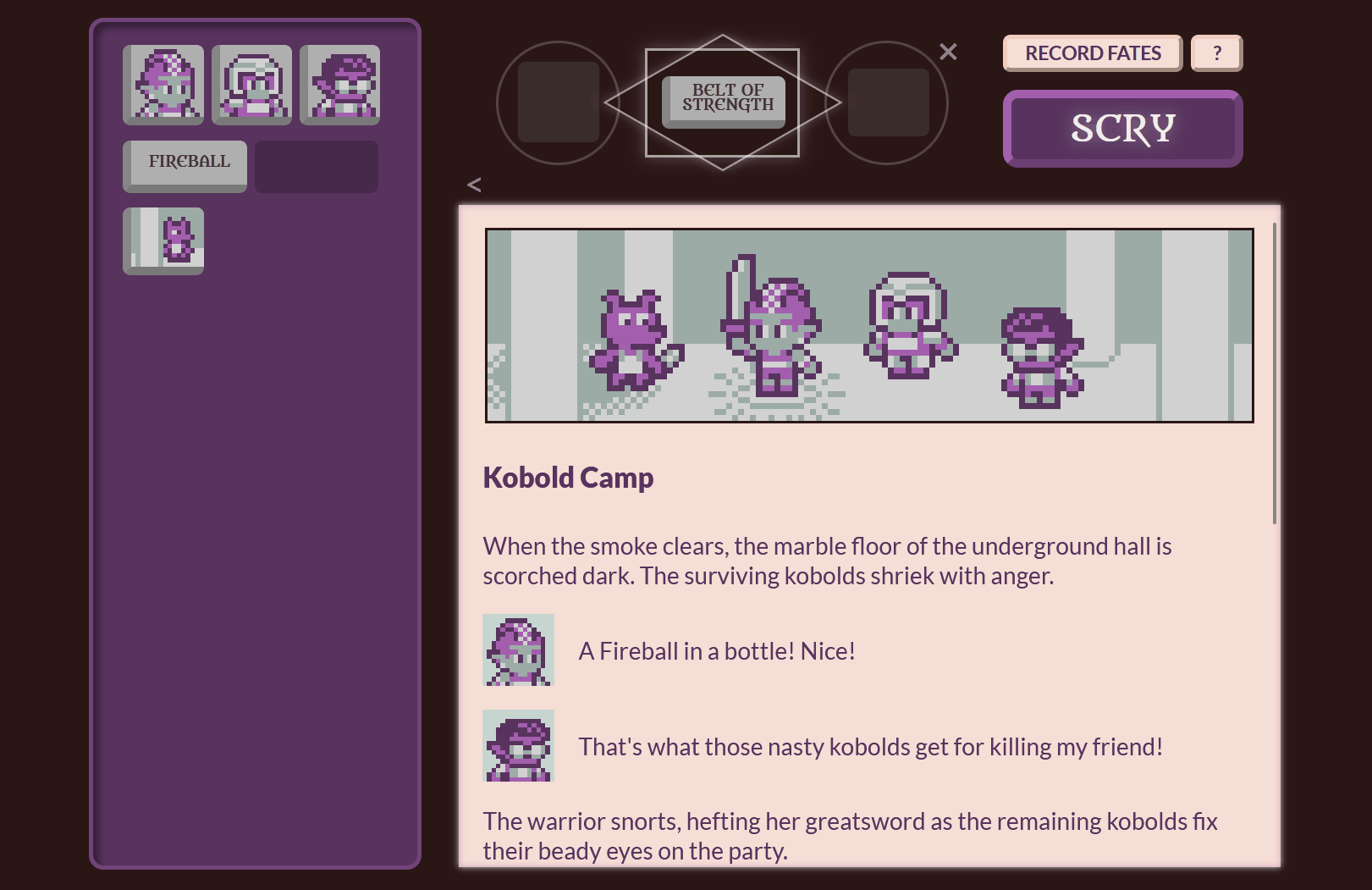
Thanks for reading!
I'm really happy with how The Case of the Dungeon Descent turned out and I hope players enjoy it as much as I enjoyed the process of making it! Thank you for reading and please let me know your thoughts, I love talking about these things.
The Case of the Dungeon Descent
Scry to investigate the princess's fate
More posts
- Post-post-jam changelog20 hours ago

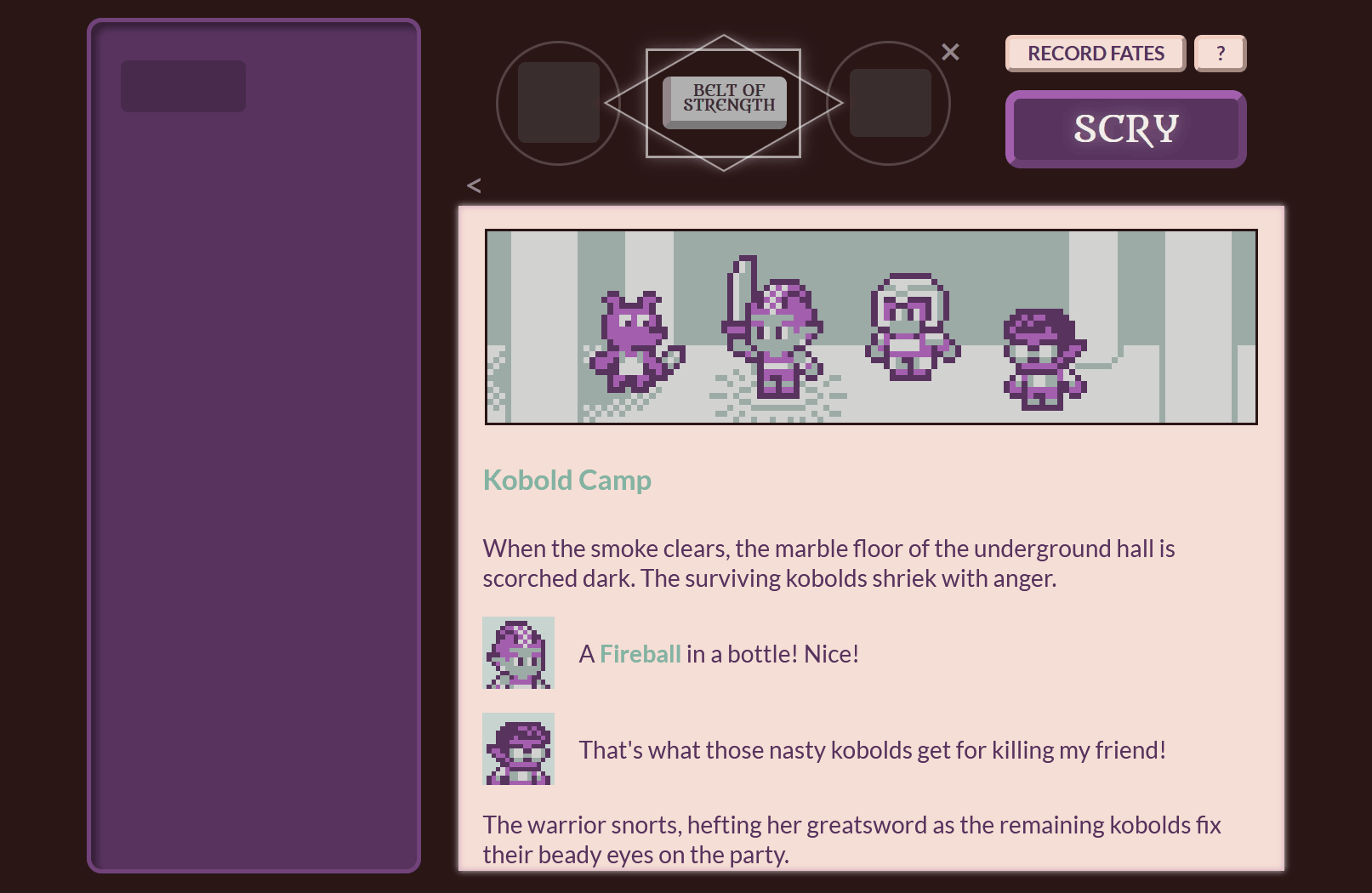
Comments
Log in with itch.io to leave a comment.
Thanks for the indepth devlog! I'll probably play it again, after checking out Type Help!